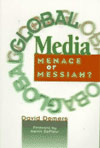book
Global Media: Menace or Messiah?
by David DeMers, Professor, Communication :: Hampton Press :: Reviewed by Jim Fisher '69

Revealing the answer to the question posed by the title of this book by David Demers, associate professor of communication at Washington State University, will not deprive anyone of a reason to read it. Global media, the planet-embracing corporations like Time Warner and Disney that bring us information and entertainment, are neither menace nor messiah. Few prospective readers would suspect the latter. The book's value lies in its refutation of the former, a charge popularized by Noam Chomsky and other Jeremiahs of the left.
The charge—that the corporatization and consolidation of media organizations lead inevitably to their uncritical acceptance of powerful institutions and failure to propagate a diversity of ideas—is plausible enough. Who, after all, cannot be concerned by predictions that within the next decade more than half of all communication media revenues will flow to fewer than five companies?
The only problem with the charge, Demers argues persuasively, is that it is not true. Just as newspaper employees recognize that local ownership does not necessarily result in greater independence for them, Demers shows that turning control of individual media organizations over to professional managers often results in more criticism of dominant values and presentation of a greater range of ideas.
This "managerial revolution" supplanting direct control by owners, Demers writes, "is the most underappreciated trend in the media industry today." He attributes the failure to acknowledge it to "the overwhelming bias among mass communication scholars toward any perspective that may even hint that corporations have the potential to pursue goals other than profits."
Demers does not assert that bias withers as organizations become more complex, though. Their enduring bias, he says, is toward the mainstream, including what we call conservatism and liberalism, and against extremes on both ends. And insofar as global media organizations are centered in the West, they are biased toward Western values of responsible capitalism, representative democracy, religious and ideological tolerance, and racial and sexual equality.
To people who do not share those values, global media may indeed look like a menace. To the rest of us, they will probably resemble not so much a messiah as an 800-pound gorilla we can live with.
— Jim Fisher 69, editorial page editor, Lewiston Morning Tribune